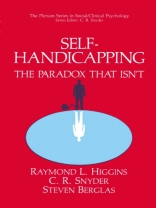The concept of self-handicapping can be legitimately anchored in a vari- ety of intellectual contexts, some old and some newer. As this volume reminds us, Alfred Adler was perhaps the first to articulate the signifi- cance of various self-defeating claims and gestures for protecting the self- concept. Thus the apparent paradox of "defeat" in the interests of "pro- tection. " More recently (but still more than 30 years ago), Heider’s "naive psychology" added attributional rhetoric to the description of self-defeat- ing strategies. While predominantly cognitive in its thrust, the attribu- tional approach incorporated several motivational influences-especially those involving egocentric concerns. Heider hardly violated our common sense when he suggested that people are inclined to attribute their performances in a self-serving manner: the good things I caused; the bad things were forced upon me. The notion of self-handicapping strategies, proposed by Berglas and myself a little more than a decade ago, capitalized on these homely truths while adding a particular proactive twist. We not only make ex- cuses for our blunders; we plan our engagements and our situational choices so that self-protective excuses are unnecessary. In doing so, we use our attributional understanding to arrange things so that flawed and failing performances will not be interpreted in ways that threaten our self-esteem.
Steven Berglas & Raymond L. Higgins
Self-Handicapping [PDF ebook]
The Paradox That Isn’t
Self-Handicapping [PDF ebook]
The Paradox That Isn’t
购买此电子书可免费获赠一本!
语言 英语 ● 格式 PDF ● ISBN 9781489908612 ● 出版者 Springer US ● 发布时间 2013 ● 下载 3 时 ● 货币 EUR ● ID 4589697 ● 复制保护 Adobe DRM
需要具备DRM功能的电子书阅读器












